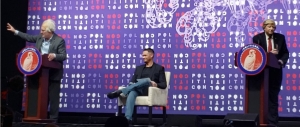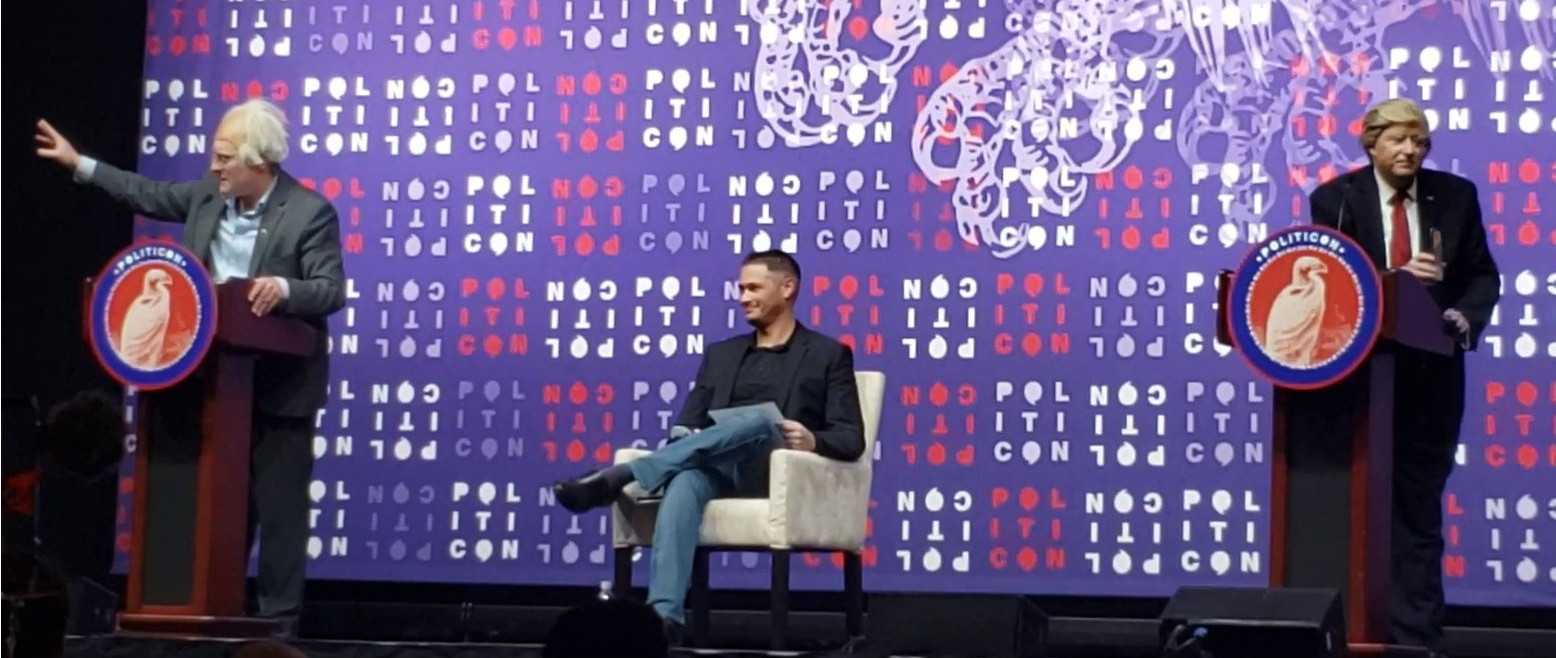
I attended Politicon, the Unconventional Political Convention, as they call themselves. It has been organized yearly since 2015 by Simon Sidi, previously known for running rock music concerts. The first four events were held in California, this year Politicon moved to the Music City Center in Nashville, Tennessee, on October 26 and 27, 2019.
I like this kind of political events because in a casual atmosphere sometimes people say more than they would do on an official platform. The informal settings with guests representing the full spectrum of our deeply divided politics, and an equally divided audience of political junkies, is an opportunity to have a peek behind the curtain of politics. Some pundits test the waters for their fringe ideas, signaling upcoming shifts. Sadly, I did not find any of this at Politicon this year; unofficially, the talents, as moderators and guests were called, did not tell us anything new above what a political junkie could find everywhere, without going to Politicon.
The best hour during this year’s Politicon was the mockery of the Trump vs. Bernie debate, which actually never happened but was joyfully presented by comedians Anthony Atamaniuk as Donald Trump and James Adomian as Bernie Sanders. Besides its strictly theatrical value, this debate is the best wrap-up of our current political dilemma, the choice between Donald Trump and the Bernie Sanders kind of Democrats.
Donald Trump seems to be emerging as the Republican candidate, even without much trying. So far, Republicans in five states (Kansas, South Carolina, Nevada, Arizona and Alaska) have cancelled primaries, ensuring that Trump is the only candidate. At Politicon we could hear three currently declared Republican challengers who, despite the above, dauntlessly keep trying: Bill Weld, Mark Sanford and Joe Walsh.
In years 2011-13, Joe Walsh got some name recognition as a persistently uncompromising one-term congressman from Illinois, but he gained popularity as a witty radio talk-show host. His wit shined at Politicon as well, but it could not substitute for his shallow understanding of the crux of our problems. In particular, Walsh enthusiastically supported Trump in 2016, only to turn into an ardent critic two years later. He should be asked what he did not see in Trump in 2016 that became so obvious not much later. He was not challenged that his inability to foresee things that most likely would happen might disqualify him as a presidential candidate.
Mark Sanford was spared the troubling questions as well. He doubted that Trump’s impeachment would work. He was not asked if this opinion comes from his own experience as a former governor of North Carolina who, 10 years ago, barely avoided being impeached. For those who might not remember, Sanford was that politician who in 2009 disappeared for five days without a trace, but journalists found that he was in Buenos Aires with his Argentinian soul mate, as he called her, or his mistress, as media reported. Besides this flap, Sanford has a good reputation for prudence with public finances. He proved that during his eight years as governor of North Carolina, and during 12 years in Congress, six of them after his governorship. With his focus on our overwhelming national debt as the biggest threat to national security, he might be one of the best presidential candidates among all running. However, keeping in mind his Argentinian incident, we should worry that as soon as he might become an important candidate, intelligence services from China, Russia, Iran, North Korea and many other countries will go into overdrive to turn into his next soul mate one of their attractive agents. He should be asked about this concern, but he was not.
No doubt, Bill Weld has a spotless record as a statesman, and a long list of accomplishments as a former governor of Massachusetts, and from his work within the federal administration. His balanced approach to our antagonizing problems would make him the perfect presidential candidate for the 2000 election, but a little anachronistic one for the frustrated seniors and impatient millennials of today. The nation is in much worse shape than it was 20 years ago. Americans feel in their bones that we need some major realignment; Trump perfectly sensed this in 2016 and offered a simplified solution. Weld stated aptly during the debate that we need more grownups in DC. In order to get there, these grownups need to explain in simple terms to irritated Americans how they will work out our unresolved for decades problems such as immigration, health care, education, neglected infrastructure, and overwhelming distrust in government administration at all levels in general. Weld was not grilled on these details, even though he should be.
In other sessions, our for decades not unresolved problems popped up, but listening to politicians and pundits, who constitute our political elite, I could not spot any new ideas, besides those already vainly circulating in public discussions. The immigration crisis took a big part of the conversation of Ann Coulter with David Frum. In her key statement supporting the Trump immigration policy and the wall, Coulter stated that for a long time Americans felt betrayed by politicians who promised to resolve our immigration crisis but never did anything about it. She pointed out that Americans embraced Trump solely for his hard-core approach to immigration, and in exchange look indulgently at other aspects of Trump’s policies and the flaws in his character.
If Frum or Steven Olikara, moderating the debate, had done their homework on our immigration mess, they would know that a majority of Americans are deeply misinformed on immigration, beginning from the proponents of eugenics one century ago to the populists such as the Master of Deception, seconded by pundits such as Coulter today. The immigration policy they want is simply un-American; it contradicts the fundamental American principles, it equals abandoning basic American values, and most of all it is detrimental to the nation’s economy.
Americans felt betrayed because every reasonable politician eventually needs to take reality into account. Hence, politicians try to do the impossible: keep immigrants coming because they are needed for the nation’s well-being but, at the same time, convince their misinformed electorate that they are against immigration. Coulter should be told that her approach to immigration means depriving the most entrepreneurial among us of the labor they need to keep America prosperous, at the cost of using taxpayers’ money to accommodate the laziest among us. It is socialism in its crystalline form. It would be interesting to hear Coulter’s answer, but she was not asked why she supports socialism.
The session about Medicare for All was best summarized by a comment on another forum to the effect that we do not discuss our problems, we talk past each other. On the stage we had: Brianna Gray, the national press secretary for Bernie 2020; Buck Sexton, a right-leaning political commentator; Sally Kohn, a left-leaning political commentator; Professor Jonathan M. Metzl, a scientist specializing in health care and politics; Glenn Jacobs a local politician, mayor of the Knox County in Tennessee, with a keenness for government efficiency; and as the moderator, Bob Cusack, the editor in chief of The Hill, one of the most reputable political publications. In other words, we had in one place people representing all sides of the health care debate. Unfortunately, advocates on every side of the issue have their arguments dismissed by their opponents.
None of them, including the moderator, was able to kick debaters out of their comfort zone, and make them answer to the merit of their opponents’ arguments. In many moments the debate brushed at key issues and it was seeking to corner someone by bringing up one of the 19 health care issues that politicians avoid talking about. It did not happen.
It was one more illustration how our political elite is divided, not only by the difference of opinions but due to simple intellectual indolence, by sticking to the comfort of one’s ideological echo chamber, and by cashing in on having many followers. Sadly, America is so big that many false prophecies can find enough supporters, guaranteeing a comfortable life for the elite. The question not asked by anyone at Politicon is: For how long can this last before hurting the nation irreversibly?

 Many tell us what to think. I ask my readers to be skeptical. Question me and others.
Many tell us what to think. I ask my readers to be skeptical. Question me and others. 
